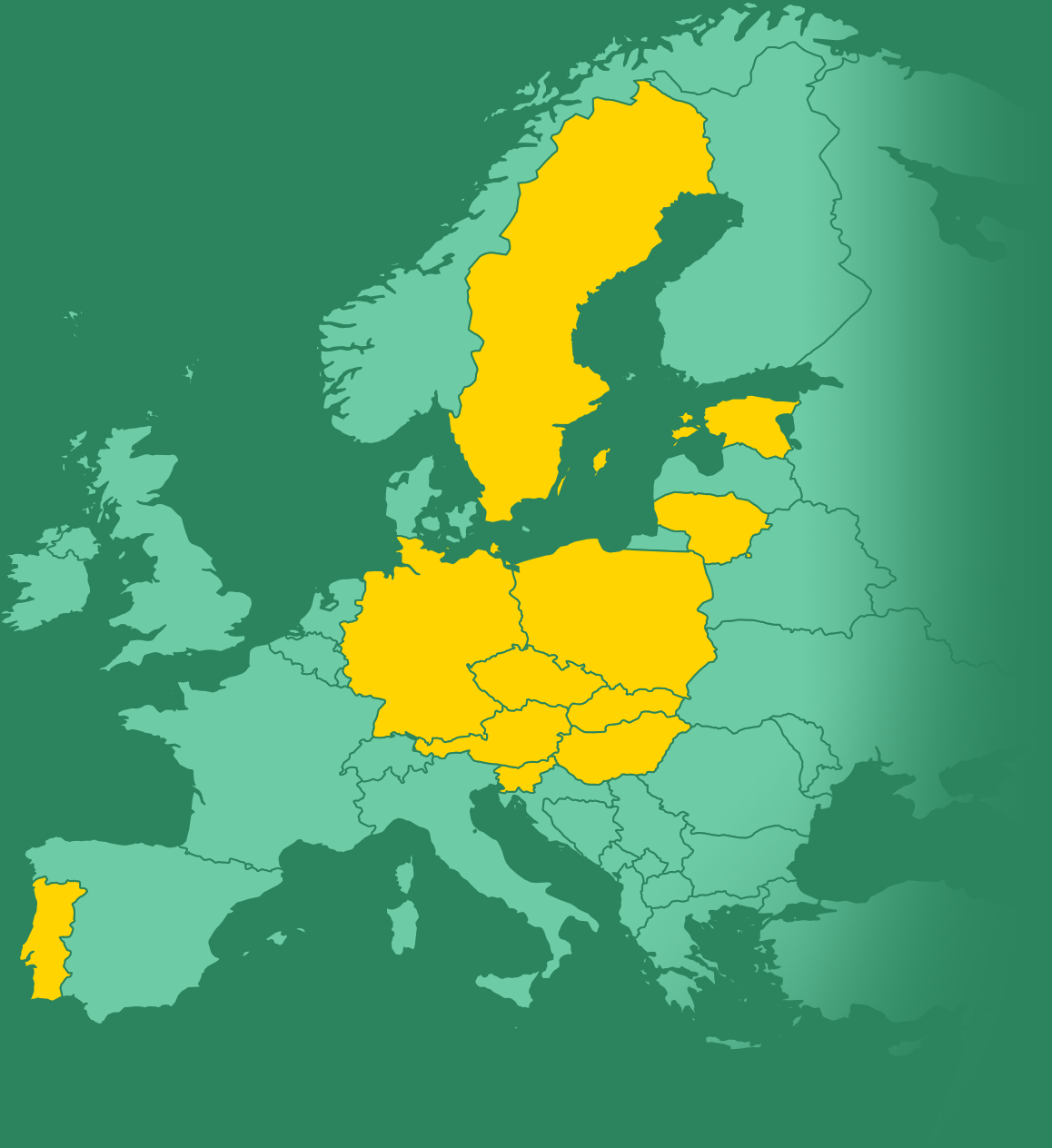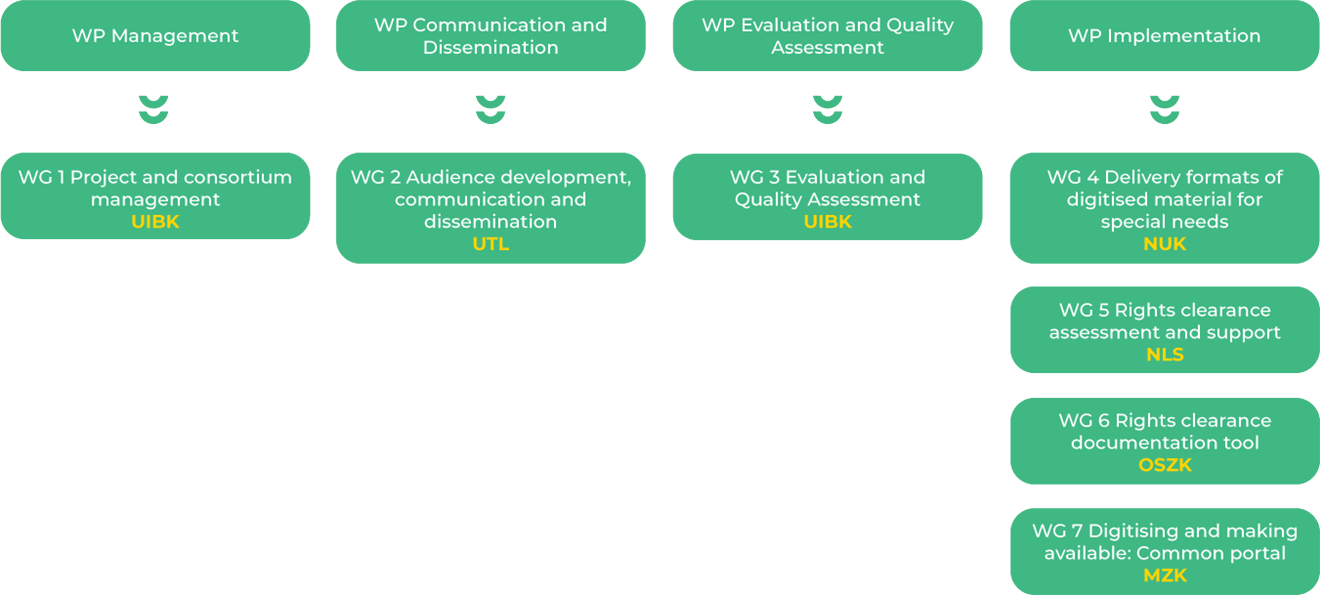About the project
Libraries all over Europe face the difficult challenge of managing tremendous amounts of 20th and 21st century textual materials which have not yet been digitised because of the complex copyright situation. These works cannot be accessed by the general public and are slumbering deep in library stacks, as they are often out-of-print or have never even been in-print at all and reprints or facsimiles are out of sight.
Introducing EODOPEN
Project Objectives
The EODOPEN project focuses on bringing European 20th and 21st century digitally-hidden stacks to the public forefront by directly engaging with communities in the selection, digitisation and dissemination processes while at the same time reinforcing the capacity of library staff with regards to dealing adequately with rights clearance questions. In addition, the project will broaden the scope to alternative delivery formats in order to reach an even larger audience, especially adequate formats for users of mobile devices as well as blind or visually impaired users.
Thus, the EODOPEN project makes a sound contribution to the Creative Europe programme by realizing three main objectives:
Objective 1
To digitise and make available literary works from the 20th and 21st century otherwise digitally hidden to a wide European community, stimulate interest in and improve access to 20th and 21st century cultural heritage, including grey and scientific literature, to the broad public and enhance intercultural dialogue with the national, regional and local community by:
- involving the community in the selection, digitisation and dissemination processes of the material,
- clearing rights and fully respecting the current copyright regime,
- digitising the selected material,
- adapting digital objects for people with disabilities,
- building a dedicated common portal in order to duly display the project outputs, which will be made sustainable over the project-lifetime and
- supporting the circulation of the project outputs, the digitised 20th and 21st century European literature, by ensuring the widest possible accessibility to the general public.
Objective 2
To improve access to 20th and 21st century textual works for blind and visually impaired users and for a younger audience by
- providing librarians and other cultural workers with the skills, competences and know-how to produce alternative delivery formats, as the current predominant delivery format of literary works digitised in libraries is not apt for all users and uses,
- evaluating current technical solutions and improving current workflows and processes,
- ensuring the sustainable use of provided books in alternative formats by taking into account established workflows and existing services, and
- finally actually delivering alternative formats to blind and visually impaired users, as well as mobile users.
Objective 3
To reinforce the capacity of library staff and of other cultural heritage institutions to operate regionally, nationally, transnationally and internationally with regard to dealing adequately with rights clearance questions by
- providing librarians and other cultural workers with the skills, competences and know-how to clear rights for digitisation and the provision of 20th and 21st century literary works while fully respecting the current copyright regime,
- providing librarians and other cultural workers with the technical infrastructure for appropriate documentation of rights clearance activities,
- addressing librarians and other cultural workers far beyond the EODOPEN consortium by producing and disseminating outputs for all European libraries and cultural institutions.
Partnership
The EODOPEN project builds upon the partnership and infrastructure of the eBooks on Demand (EOD) Network, established in July 2008 and by now a self-sustained network. Just like the EOD network has moved from a publicly funded project to a self-sustained network, the EOPEN project will attract institutions outside the project and create a momentum beyond the duration of the project.
The project consortium is led by the University of Innsbruck and consists of 15 project partners representing 11 European countries ranging from Portugal to Lithuania and Sweden.
All EODOPEN project participants have substantial experience in working in projects at European level. Almost all project partners have been working together in previous projects and networks (e.g. eBooks on Demand network, ARROW).

Work packages
In order to guarantee for a smooth realization of the planned activities and expected outputs, seven working groups are established which will carry out the tasks.

This work package includes all management tasks at the project level and intends to provide effective management of the partnership, financial planning and management, activity planning and reporting related to progress management and quality management throughout the duration of the project to ensure successful completion of the project objectives within the agreed time schedule and budget on a high level standard.
Lead WG 1: University of Innsbruck (Austria)
EODOPEN has two strategic goals:
- Two-way communication in order to strengthen the image between partners and audiences by asking input, making the required works available, fostering a continuous intercultural dialogue about the works and improving the visibility of the contents in cooperation with the audiences. The audiences are local, regional, national and transnational groups who need to access the works.
- Via knowledge sharing to professionals across the EU and beyond to present the project consortium as a knowledge tank for the professional community who innovates the field of libraries or side areas. The professionals are regional, national and international groups who need the created knowledge about rights clearance.
Lead WG 2: University of Tartu Library (Estonia) in close cooperation with the University of Innsbruck (Austria).
This working group will critically assess the ongoing progress of the project. Each project partner will be represented by one representative. At milestones defined in the first meeting of this group, also external experts as well as further libraries from the EOD network can be invited if necessary. The group will assess the project results both in qualitative and quantitative terms and provide feedback for improvement. The group will meet on a yearly basis and will answer the following questions for each outcome specified in the detailed description:
- accurate timing of output;
- achieved goals according to detailed description / grant agreement;
- recommendations.
Lead WG 3: University of Innsbruck (Austria) in close cooperation with all project partners.
On the contrary, mobile devices such as tablets and e-readers are the most suited devices for reading ebooks and require alternative formats. Besides, the use of smartphones is particularly popular with young users, and blind and visually impaired users require other special formats, for instance in form of Digital Talking Books. To ensure the sustainable use of the provided books, an extensive evaluation of the needs of users and technical requirements for special formats is necessary. Established workflows for producing ePub formats from OCR (Optical Character Recognition) and HTR (Handwritten Text Recognition) by partner libraries and existing services like Robobraille will be taken into account as well as results from EU projects such as READ and IMPACT. Further delivery formats like creating mp3 from full text or mp3 on demand will be taken into consideration.
Lead WG 4: National and University Library (Slovenia) in close cooperation with other project partners.
Legal insecurity is the strongest “innovation barrier” for making available 20th and 21st century cultural heritage. The vast majority of library staff feels very uncomfortable when clearing rights. Therefore, this working group aims at capacity building of library staff in terms of rights clearance. First, the WG will assess IPR and rights issues, especially focusing on the complex circumstances of digital access across borders. It will explore, in the context of the rapidly changing digital landscape, new developments, opportunities, challenges and solutions to existing rights issues.
Lead WG 5: National Library of Sweden in close cooperation with other project partners.
Rights clearance is a substantial part of the work to be carried out when digitising 20th and 21st century literary works. However, no uniform tool or IT infrastructure exists to support librarians in the important task of documentation of the rights clearance processes. These processes range from the documentation of the so called “diligent search” in case of orphan works or direct communication processes in case of agreements with authors or publishing houses to finally the back-and-forth communication in the process of supporting self-archiving deposits of researches at the own institution. This working group will aim at developing tool(s) to support library staff in duly documenting the search and communication processes.
Lead WG 6: National Széchényi Library of Hungary in close cooperation with other project partners.
All project partners together will digitise and make available at least 15000 works after having rights cleared. In order to visualize and make available those main project results, namely the digitised 20th and 21st century literary works, in this working group a common portal will be built. In addition, this common portal will cater for the sustainability of the project as it will be integrated into the well established eBooks on Demand service. As a side effect, the working group will further propagate well established standards and frameworks such as IIIF (International Image Interoperability Framework) within the community of libraries, to raise awareness about the IIIF standards and enlarge the IIIF community. Finally, the common portal will play a key role in the dissemination and outreach work.
Lead WG 7: Moravian Library in Brno (Czech Republic) in close cooperation with all project partners.